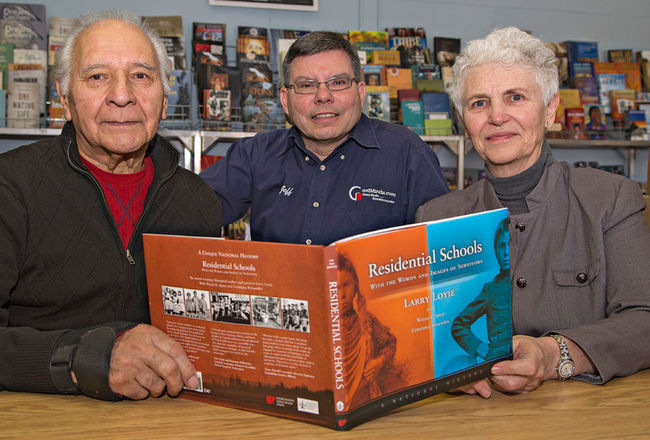New Book Chronicles Complete Residential School Experience
By Michael-Allan Marion
It took Larry Loyie 21 years to research completely the ordeal he went through as a native student in a residential school -- and the return to class in middle age for the education he never got there -- to be able to write the book he long had in mind. Loyie's determination and talent inspired Constance Brissenden and Wayne K. Spear to join him in turning out Residential Schools, With the Words and Images of Survivors, a national history that is going out to schools and bookshelves across Canada. Their project so impressed multimedia producer Jeff Burnham that he made the book the first publication launched by Indigenous Education Press and GoodMinds.com. "The residential schools are still a hidden history," Loyie said with Brissenden and Burham beside him during a launch for the book at the offices of Indigenous Press Education at 188 Mohawk Street. "My goal has always been to open up this history to all Canadians. It honours the students, their cultures and their families." In its seven chapters, Residential Schools tells the importance of culture and traditions, family, life at school, the dark side of abuse, friendships and even laughter in a system that encompassed First Nations, Inuit and Metis children across Canada. It also reveals the power of healing and education in a changing world. At the centre is the story of Loyie, a Cree who went for four years to a public school and lived with his family in a wooded area in Great Slave Lake, Alberta. At the age of nine, he writes in the introduction, "I lost this beautiful way of life when I was forced to attend a residential school." For six years in the 1940s, he attended St. Bernard Mission residential school in Grouard, one of Alberta's 25 such schools. He wasn't allowed to speak Cree, and he really didn't get an education in the years he spent there. Instead of being in a classroom with books and a teacher, he was one of many pressed into child labour, doing chores needed to sustain the school. He had to feed the cattle, pick potatoes, and pile wood to fuel the school's five "humongous" buildings. "We got no benefit from all that work," he said. "Education was a secondary thing. Sustaining the school took priority. I thought I would get an education. I didn't." If he had been in class, he probably wouldn't have learned much anyway, he said, because most of the teachers were not trained. "I did have one educated teacher, Sister Theresa, who inspired me to continue learning," Loyie noted in his introduction. "I am grateful to her." in the interview, he said: "If it hadn't been for her, I wouldn't have made it to Grade 8." Loyie went back to school at age 58 to get the education he was denied. "I got a lot of razzing from the other students," he recalled in the interview. "they'd say, 'Oh, grandpa...' It didn't phase me one bit." He said he knew he wanted to write about his experience so he insisted on learing typing early on. "I knew I wanted to be a writer, so whenever I wrote, my script was ready." Brissenden, a freelance writer and editor of several books, first encountered Loyie in a creative writing class in downtown Vancouver. She said she saw right away the power of his creative writing. "He had such good ideas." They collaborated on a short memoir, an educational book meant for children called, As Long as the Rivers Flow. Set in 1944, it recreates the summer Loyie -- then 10 years old -- spent with his Cree family before being forced to attend residential school. In the last passage, he and his siblings are crying as their parents load them into a truck to be taken to the residential school. "The sides of the truck were high. He couldn't see his family," Loyie wrote. "As the truck pulled away, all he could see was the sky." Loyie said the memoir compelled him to tell the larger story. Brissenden collaborated as an editor and compiler of photos from residential school survivors. Meanwhile, Burnham followed the progress of the two. "I knew they were working on it. We were talking about it," he said. "I knew the quality of work they would produce. I didn't have to say how I wanted anything done. We trusted each other." Spear's contributions also stem from his background. A Mohawk, he was born in Buffalo, New York, and grew up in Fort Erie. He has worked for more than two decades in health and education. He is a former director of communications at the Aboriginal Healing Foundation and lives in Toronto. He is the author of Full Circle: The Aboriginal Healing Foundation and The Unfinished Work of Hope, Healing and Reconciliation, published in 2014. Despite all the work done in getting an apology, reconciliation and settlement from the federal government for the wrongs of the residential school system, not much is known publicly about the period, said Brissenden. "The information is still scattered. We just don't know the story very well," she said. "It needs to be in the school curriculums." Residential School, With the Words and Images of Survivors, is available through www.goodminds.com, a wholesaler of First Nations, Inuit and Metis books. To order by phone, call 1-877-862-8483. Contact: michael-allan.marion@sunmedia.ca
|
.
Any original material on these pages is copyright © BishopAccountability.org 2004. Reproduce freely with attribution.
